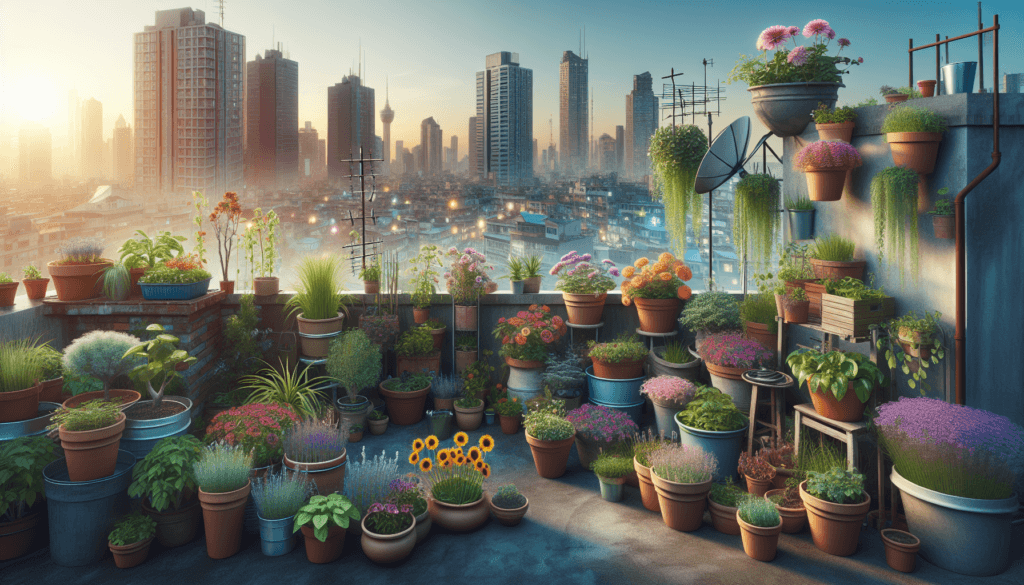Living in a bustling city, finding ways to connect with nature can often be a challenge. However, with the rising popularity of container gardening, urban dwellers now have the opportunity to bring the beauty of plants into their homes and balconies. Container gardening offers a unique way to cultivate a green oasis in small spaces, allowing individuals to enjoy the benefits of gardening even in the midst of a concrete jungle. This article explores the pros and cons of container gardening, providing valuable insights for those looking to add a touch of green to their urban lifestyles.

Benefits of Container Gardening
Accessibility for Urban Dwellers
Container gardening offers numerous benefits for urban dwellers, particularly in terms of accessibility. Unlike traditional gardening methods that require a large plot of land, container gardening allows you to bring the garden right to your doorstep. Whether you live in an apartment, a townhouse, or a condominium, you can easily start a container garden on your balcony, rooftop, or even by a sunny window. This makes gardening accessible to individuals who may not have access to a yard or outdoor space, allowing them to embrace the joys of gardening in an urban environment.
Limited Space Requirements
One of the main advantages of container gardening is its ability to thrive within limited spaces. In urban areas where outdoor space is at a premium, container gardening provides a perfect solution for those who are eager to cultivate their own plants and herbs. With containers, you can make the most of small areas by strategically placing pots and planters in the available space. Whether it’s a corner of your balcony or a small part of your patio, container gardening allows you to maximize the use of limited space, turning it into a green oasis.
Aesthetic Enhancement
Container gardening not only adds a touch of greenery to your urban living space but also enhances its aesthetic appeal. With a wide range of containers available in different shapes, sizes, and materials, you can select pots that complement your personal style and the overall design of your home. From modern and sleek designs to rustic and vintage-inspired containers, there are endless options to choose from. Not only can you showcase an array of beautiful flowers and lush foliage, but you can also create visually appealing arrangements that elevate the visual appeal of your surroundings, creating a soothing and inviting ambiance.
Flexibility and Mobility
Another advantage of container gardening is the flexibility and mobility it offers. Unlike traditional gardens that are fixed to a certain location, container gardens can easily be rearranged and moved to different areas of your living space. This gives you the freedom to experiment with different layouts and designs, allowing you to find the optimal placement for your plants based on sunlight, temperature, and space requirements. Additionally, if you are relocating to a new home, you can easily transport your beloved container garden with you, ensuring that your plants stay with you no matter where you go.
Challenges of Container Gardening
Limited Plant Selection
While container gardening offers many benefits, one of the challenges is the limited selection of plants that can thrive in containers. Not all plants are suitable for container gardening, as some have extensive root systems or require more space to grow. However, this doesn’t mean you are limited to a few options. Many varieties of flowers, herbs, vegetables, and even small fruit trees can successfully be grown in containers. By doing some research and selecting plants that are well-suited for pots, you can still create a diverse and beautiful container garden.
Limited Plant Growth Potential
Another challenge of container gardening is the limited growth potential of plants. In comparison to plants grown in open ground, container plants have a more restricted root space, which can limit their growth and overall size. Additionally, containers may not provide the same amount of soil insulation as the ground, making them more susceptible to temperature fluctuations. To address these challenges, it is important to choose appropriate container sizes for your plants, provide adequate soil and nutrients, and regularly monitor the health and growth of your plants to ensure they thrive in their containers.
Maintenance Requirements
Container gardening requires diligent maintenance to ensure the health and vitality of your plants. Unlike plants in the ground, potted plants have more limited access to soil nutrients and moisture, requiring regular attention to watering, fertilizing, and proper drainage. Depending on the type of plants you choose, they may have specific care requirements, such as pruning, pest control, or disease prevention. It is essential to consistently monitor your plants and provide them with the necessary care to avoid potential issues and maintain a thriving container garden.
Watering and Drainage Issues
Watering and drainage can be a common challenge in container gardening. Containers, especially those without proper drainage holes, can easily trap water, leading to root rot and other moisture-related issues. Additionally, plants in containers may require more frequent watering than those in traditional gardens, as containers tend to dry out more quickly. Balancing the amount of water your plants need without overwatering or underwatering them is crucial for their overall health. Ensuring that your containers have proper drainage and using well-draining soil can help maintain the optimal moisture levels for your plants.

Sustainability and Environmental Impact
Reduced Carbon Footprint
Container gardening promotes sustainability by reducing your carbon footprint. By growing your own plants, you can minimize the need for store-bought produce, which often requires long-distance transportation and can contribute to greenhouse gas emissions. Additionally, container gardening allows you to cultivate plants without the use of chemical fertilizers and pesticides, promoting organic and eco-friendly practices. By embracing container gardening, you contribute to a more sustainable and environmentally conscious lifestyle.
Utilization of Recycled Materials
Container gardening also provides an opportunity to repurpose and utilize recycled materials. Instead of purchasing brand new containers, you can be creative and resourceful by using items such as old buckets, wine barrels, wooden crates, or even repurposed furniture. Not only does this reduce waste by giving new life to materials that would otherwise end up in landfills, but it also adds a unique and charming character to your container garden. By incorporating recycled materials into your gardening endeavors, you make a positive impact on the environment while showcasing your creativity.
Health and Well-being Benefits
Stress Reduction
Container gardening offers numerous health benefits, starting with its ability to reduce stress. Spending time in nature and engaging in activities such as planting, watering, and nurturing plants has been proven to have a calming effect on the mind and body. The act of gardening helps to lower cortisol levels, the stress hormone, and promotes the release of endorphins, which contribute to a sense of well-being and relaxation. Whether you are tending to your container garden after a long day at work or simply taking a moment to appreciate the beauty of your plants, you can experience the therapeutic benefits of gardening and find respite from the stresses of daily life.
Improved Air Quality
Container gardening can significantly improve the air quality in your urban dwelling. As plants perform photosynthesis, they absorb carbon dioxide and release oxygen, thereby purifying the air. By bringing plants indoors or creating a green outdoor space, you can enhance the air quality within your home and offset the pollution often found in urban environments. Additionally, certain plants have been shown to have air-purifying qualities, effectively removing toxins from the air and promoting a healthier living environment for you and your family.
Access to Fresh Herbs and Vegetables
One of the most rewarding aspects of container gardening is the ability to grow your own fresh herbs and vegetables. With a small space in your container garden, you can cultivate a variety of herbs such as basil, rosemary, mint, and parsley, which can be easily used in your everyday cooking. Freshly picked herbs not only add vibrant flavors to your dishes but also provide numerous health benefits. Container gardening also allows you to grow vegetables such as tomatoes, peppers, lettuce, and carrots, ensuring a supply of nutritious and organic produce right at your fingertips.

Cost Considerations
Affordability
Container gardening offers a cost-effective way to embark on a gardening journey. Compared to traditional gardening, which often requires investing in tools, fertilizers, and other equipment, container gardening is relatively affordable. The main expense is purchasing containers, soil, and plants, which can be done within a reasonable budget. Additionally, by growing your own herbs and vegetables, you can save money that would otherwise be spent on store-bought produce. With careful planning and smart plant selection, container gardening can be an affordable and enjoyable hobby.
Investment for Long-Term Benefit
While container gardening may require some initial investment, it is a long-term investment with numerous benefits. Instead of spending money on cut flowers that wilt within days, container gardening allows you to enjoy the beauty of plants that can thrive for months or even years with proper care. By nurturing your container garden, you create a lasting and ever-evolving haven that brings joy and vitality to your urban living space. The satisfaction and happiness derived from watching your plants grow and flourish are priceless and contribute to a rewarding and fulfilling gardening experience.
Educational Opportunities
Hands-On Learning Experience
Container gardening provides an excellent hands-on learning experience, especially for children. By involving them in the process of planting, watering, and maintaining the container garden, you not only foster their love for nature but also instill important skills and knowledge. Children can learn about plant life cycles, the importance of sunlight, water, and nutrients for the growth of plants, and the concept of sustainability. With each plant in the container garden, they have the opportunity to observe and understand the wonders of nature firsthand, fostering curiosity and a lifelong love for plants and gardening.
Teaching Responsibility
Container gardening offers a valuable opportunity to teach responsibility and nurture a sense of ownership. Taking care of plants requires regular attention, and children can learn the importance of being responsible for another living being’s well-being. By assigning tasks such as watering, pruning, or removing pests, children can develop a sense of accountability and empathy. Nurturing plants and seeing the direct impact of their care on the growth and health of the plants can foster a sense of pride and accomplishment, boosting their self-esteem and sense of responsibility towards the natural world.
Exploration of Nature and Life Cycles
Container gardening allows for an exploration of nature and the life cycles of plants. By observing the different stages of plant growth, children can gain a deeper understanding of the natural world and the interconnectedness of living beings. From planting seeds or young plants to watching them grow, blossom, and eventually produce fruits or flowers, children can witness the miracles of life firsthand. This hands-on experience fosters an appreciation for the beauty and intricacies of the natural world, encouraging a sense of wonder and curiosity that can extend far beyond the confines of the container garden.

Community Building
Shared Gardening Spaces
Container gardening can be a catalyst for community building, particularly in urban areas where outdoor spaces may be limited. Shared gardening spaces, such as community gardens or rooftop gardens, provide an opportunity for urban dwellers to come together and cultivate their own container gardens. These shared spaces foster a sense of camaraderie and collaboration among individuals with a shared passion for gardening. By exchanging ideas, experiences, and tips, community gardeners not only enhance their gardening knowledge but also create lasting friendships and a sense of belonging within their urban community.
Collaboration and Networking
Container gardening also encourages collaboration and networking among urban dwellers. Whether it’s participating in workshops, joining gardening clubs, or attending local gardening events, container gardeners have the opportunity to connect with like-minded individuals and learn from experienced gardeners. Sharing successes, challenges, and knowledge can help improve gardening skills and inspire new ideas. The sense of community formed through these connections provides motivation, support, and a shared love for gardening, creating a network of individuals who encourage and celebrate each other’s gardening journeys.
Sense of Pride and Belonging
Container gardening offers a sense of pride and belonging within the urban community. By creating a lush and vibrant container garden, you contribute to the beauty and liveliness of your surroundings. The visual impact of your container garden can inspire others to start their own gardening endeavors and bring a sense of pride to the neighborhood. Additionally, participating in community gardening initiatives and sharing the fruits of your gardening labor with others further fosters a sense of belonging and connectedness to your community. Container gardening has the power to transform urban spaces into thriving and nurturing environments that evoke a deep sense of pride and happiness.
Potential Drawbacks for Urban Dwellers
Limited Outdoor Space
One potential drawback for urban dwellers interested in container gardening is the limitation of outdoor space. While container gardening can be adapted to small spaces, such as balconies or windowsills, it may still pose some challenges if the available space is extremely limited or nonexistent. However, with careful planning and creative solutions, such as vertical gardening or utilizing hanging baskets, you can maximize the use of even the smallest outdoor areas to create a flourishing container garden.
Noise and Pollution Exposure
Urban areas are often characterized by noise and pollution, which can potentially impact the health of container gardens. Excessive noise, such as traffic or construction, can stress plants and disrupt their growth. Pollution, including air pollutants and contaminants in water sources, can also affect the health and vitality of plants. To mitigate these challenges, it is important to choose robust and resilient plants that can withstand urban conditions. Additionally, regularly monitoring and maintaining proper watering, ventilation, and pest control practices can help minimize the impact of noise and pollution on your container garden.
Lack of Expertise
For individuals new to container gardening, a lack of expertise can be a potential drawback. Without prior knowledge or experience, it can be daunting to start and maintain a successful container garden. However, there are resources available to help you overcome this challenge. Utilizing gardening books, online tutorials, and seeking advice from experienced gardeners can provide valuable guidance and support. Additionally, learning through trial and error is an integral part of the gardening journey, allowing you to develop your own expertise and find joy in the process of learning and growing with your container garden.
Risk of Vandalism or Theft
One potential drawback of container gardening, particularly for urban dwellers, is the risk of vandalism or theft. In densely populated areas, outdoor spaces may be more prone to such incidents. Containers and their contents can be targets for theft or deliberate damage, compromising the hard work and effort invested in your container garden. To minimize this risk, consider placing your containers in secure areas or using additional security measures, such as installing locks, cameras, or strategic lighting. Engaging with your neighborhood community and fostering a sense of vigilance can also help deter such incidents and create a safer and more secure gardening environment.

Choosing Containers and Plants
Consideration of Available Space
When selecting containers for your container garden, it is essential to consider the available space and size of your planting area. Measure the dimensions of your balcony, patio, or indoor space to determine the appropriate size and quantity of containers. Take into account any additional features or fixtures that may affect the placement of your containers, such as railings or windows. By carefully planning and utilizing the available space, you can create an organized and visually appealing container garden that fits perfectly into your urban living environment.
Selection of Appropriate Containers
Choosing the right containers is crucial for the success of your container garden. Consider factors such as material, drainage, and aesthetics when selecting containers. Material options range from traditional terracotta and ceramic pots to modern lightweight plastics and fiberglass. Ensure that your containers have adequate drainage holes to prevent waterlogging and root rot. Additionally, choose containers with appropriate insulation properties to protect your plants from extreme temperatures. Finally, select containers that complement the overall design and style of your living space, creating a harmonious and visually pleasing container garden.
Matching Plants to Conditions
Successful container gardening depends on selecting plants that are well-suited for the environmental conditions of your urban dwelling. Take into account factors such as sunlight availability, temperature fluctuations, and exposure to wind. Assess the microclimates of your outdoor space and identify areas with different light intensities and shade patterns. This will help you choose plants that can thrive in specific locations, ensuring their optimal growth and development. Research the specific requirements of each plant, including its preferred light levels, temperature range, and watering needs, to make informed choices and create a thriving container garden.
Consideration of Sunlight and Shade
Understanding the sunlight and shade patterns in your urban dwelling is crucial for successful container gardening. Assess the amount of sunlight your outdoor space receives throughout the day. South-facing balconies may receive direct sunlight, while north-facing areas may have more shade. East and west-facing locations may have a mix of sunlight and shade at different times of the day. Observing these patterns will help you choose the right plants for different areas of your container garden. Some plants thrive in full sun, while others prefer partial shade or full shade. By matching plants to the appropriate light conditions, you can ensure their optimal growth and maximize the beauty of your container garden.
Tips for Successful Container Gardening
Proper Soil and Drainage
Use high-quality, well-draining soil specifically formulated for container gardening. Avoid using garden soil, as it may not provide the ideal balance of nutrients and drainage. Incorporate perlite or vermiculite into the soil mix to improve drainage and aeration. Additionally, ensure that your containers have adequate drainage holes to prevent water from accumulating and causing root rot. Placing a layer of small rocks or pebbles at the bottom of the container can further enhance drainage. Regularly check the moisture level of the soil and adjust watering accordingly to maintain optimal soil moisture and prevent waterlogged roots.
Regular Watering and Nutrition
Container plants require regular watering to maintain their health and vitality. The frequency and amount of water needed vary depending on factors such as plant type, container size, temperature, and humidity levels. Monitor the moisture level of the soil by inserting your finger into the soil up to the second knuckle. If the soil feels dry at that depth, it’s time to water. Avoid overwatering, as it can lead to root rot and other moisture-related issues. Fertilize your container garden with a balanced, slow-release fertilizer or organic compost to provide essential nutrients for healthy plant growth. Follow the recommended dosage instructions for the specific fertilizer or compost being used.
Sunlight and Temperature Management
Observing the sunlight and temperature patterns in your urban dwelling is essential for managing your container garden effectively. Pay attention to areas of direct sunlight, partial shade, or full shade. Move containers that require more sunlight to sunnier areas and those that prefer shade to shadier locations. Additionally, be mindful of temperature fluctuations, especially during extreme weather conditions. Protect sensitive plants from frost by bringing them indoors or covering them with a frost cloth. During hot summer months, provide shade or use shade cloth to protect plants from scorching temperatures. By managing sunlight and temperature, you can ensure the optimal growth and health of your plants.
Pruning and Maintenance
Regular pruning and maintenance are vital for the health and aesthetics of your container garden. Prune your plants to remove dead or damaged parts and encourage bushier growth. Removing spent flowers or foliage can promote new growth and extend the blooming period. Additionally, monitor your plants for pests and diseases. Early detection and intervention can prevent the spread of pests or diseases and help maintain the overall health of your container garden. Regularly check for signs of nutrient deficiencies and adjust fertilization as needed. By dedicating time to pruning, monitoring, and maintaining your container garden, you can enjoy vibrant and thriving plants throughout the growing season.
In conclusion, container gardening is a wonderful option for urban dwellers who desire the joys of gardening despite limited outdoor space. The accessibility, flexibility, and aesthetic enhancement offered by container gardening make it a popular choice for individuals seeking to embrace nature in an urban environment. While there are challenges associated with limited plant selection, growth potential, and maintenance requirements, these can be mitigated with proper planning, care, and understanding. Container gardening also contributes positively to sustainability, health and well-being, and community building. By carefully choosing containers and plants, considering space and sunlight conditions, and following tips for successful container gardening, you can create a flourishing and rewarding container garden in your urban living space. Embrace the possibilities of container gardening and discover the joy and fulfillment it brings to your life.

